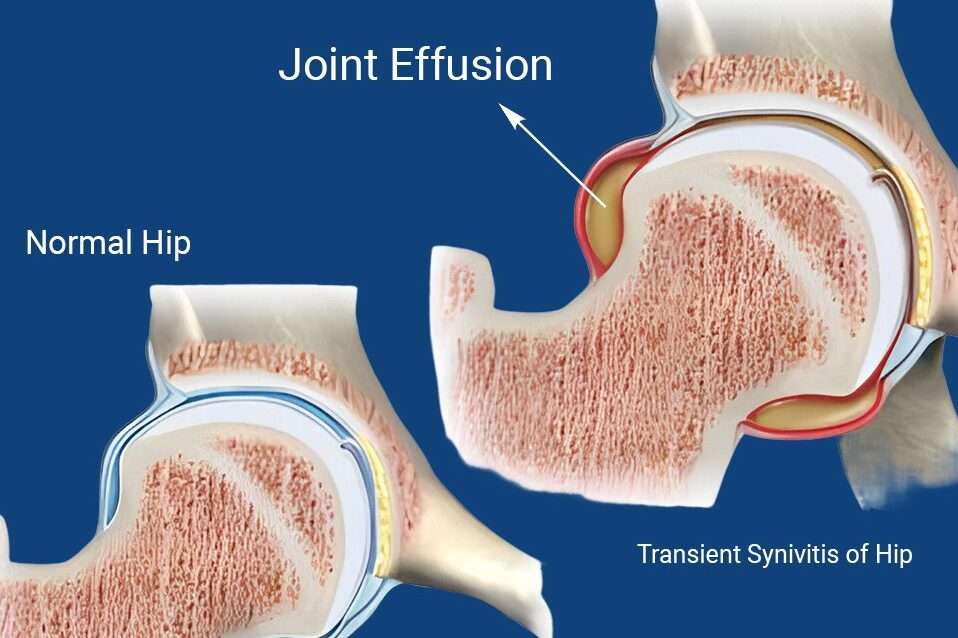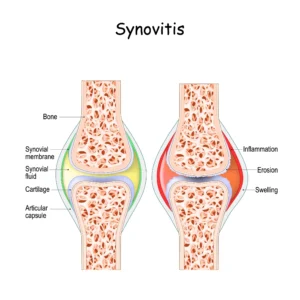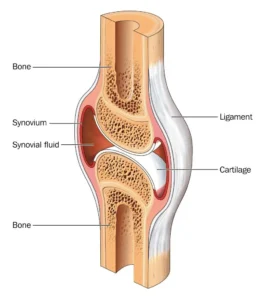Transient Synovitis Symptoms, Causes & Treatment Options
- Dr Owais Rafiq
- September 28, 2023
- 8:50 pm

What is Transient Synovitis?
Transient synovitis is a condition that affects the hip joint, especially in kids between 3 and 10 years old. This condition happens when the synovial membrane, which lines the joint, becomes inflamed. Picture your hip joint like a well-lubricated door hinge. When that lubricant gets dirty or dries up, the door doesn’t swing smoothly. That’s similar to what happens with transient synovitis—the joint might stiffen and hurt, making it tough for young ones to run or walk.
Is your child limping?
Has your child suddenly been complaining of pain and is unwilling to bear weight or has started to limp, if so, then most likely the cause may be transient synovitis a.k.a irritable hip.
Transient synovitis is the most common cause of pediatric hip pain, yet much is unknown about the condition, it is usually a benign self-limiting process that gets better on its own within 1-2 weeks and is most often affecting children aged 1-3 years.

Symptoms of Transient Synovitis
Recognizing transient synovitis can be tricky since its symptoms often mimic other hip issues. Keep an eye out for:
- Hip Pain: Kids usually complain about pain in their hip or thigh. It might come and go, making it hard to pinpoint.
- Stiffness: The hip may feel tight, particularly after resting.
- Limping: You might notice your child limping or favoring one leg more than the other.
- Limited Movement: Activities like bending or twisting the leg can cause discomfort, leading to reduced movement.
Sound familiar? If yes, it’s worth checking in with a doctor.
Causes of Transient Synovitis
The exact cause of transient synovitis is still a bit of a mystery. It sometimes follows a viral infection, like the flu or a cold. Think of your body as a fortress. When a virus breaches the walls, it can cause inflammation in various parts, including the joints. This inflammation can disrupt the smooth operation of your child’s hip joint.
In most cases, the condition is self-limiting, meaning it often heals on its own without any heavy-duty treatments.
Diagnosis: What to Expect
If you suspect transient synovitis, a visit to a pediatrician is essential. The doctor will likely conduct a physical exam and might order imaging tests, like an ultrasound or X-ray. Picture this like a detective trying to piece together a puzzle—the doctor gathers clues to figure out what’s happening with the joint. These tests help rule out other conditions, such as septic arthritis or Perthes disease, which can have similar symptoms but need different treatments.
Treatment: How to Make It Better
Treating transient synovitis is generally straightforward. For most kids, it involves:
- Rest: Allowing the joint to heal is key. Limiting activities that strain the hip, like running or jumping, can significantly aid recovery.
- Pain Relief: Over-the-counter medications, like ibuprofen or acetaminophen, can help soothe any discomfort.
- Monitoring: Regular follow-ups can ensure the condition is improving. Think of it as keeping an eye on a plant to see if it’s getting enough water.
In most cases, with the right care, kids bounce back quickly, often within a few weeks.
How to figure out if the child has an irritable hip?
Typically presents with sudden onset of thigh or groin pain and a limp or refusal to bear weight, the child may lie with hips bent and spaced apart.

What causes transient synovitis?
The exact cause is still unknown however there appears to be an association of transient synovitis with viral infection. It leads to inflammation of the joint lining causing the fluid that is normally present to increase in volume thus causing the limp and pain.
Should you be worried about transient synovitis?
Transient synovitis on its own is a self-limiting condition but there are several other conditions that may mimick irritable hip, some of them potentially devastating that if not diagnosed or treated in time may lead to irreversible damage to the joint, thus the diagnosis of transient synovitis as a cause of hip pain is mainly that of exclusion. Some of the other related conditions include
- Septic arthritis
- Juvenile rheumatoid arthritis
- Slipped capital femoral epiphysis
- Perthes disease
Are there any investigations for transient synovitis of the hip?
As mentioned earlier it is important to exclude other serious causes of hip pain and this is the main focus of investigations.
Lab investigations such as CBC, ESR, and CRP along with ultrasound of the involved hip are usually carried out before making the diagnosis of transient synovitis.
How is transient synovitis treated?
It usually resolves spontaneously and is managed by encouraging rest and observing the child. The child may be prescribed NSAIDs such as ibuprofen in conjunction.
When to seek medical advice?
o If the child has a fever of more than 38C
o Persistent limp/pain for more than 2 weeks.
o Child not wanting to eat or drink, sleeping more.
o If there is swelling, redness, or pain in any other joint.
What to expect in a case of irritable hip?
Transient synovitis would resolve on its own usually in 2-3 days and does not cause any long-term problems of the hip joint.
It may be noted though that there may be an increased likelihood of recurrence, especially within the first two years.
Dr Owais Rafiq
Subscribe to Dr Owais YouTube channel
For parenting advice, child health, symptoms, causes and treatment of illness in children.







